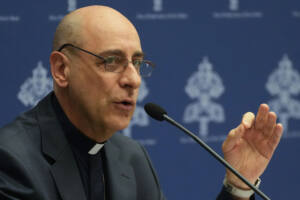
WelCom May 2024
Sex change operations, gender theory and surrogate motherhood pose grave threats to human dignity, according to a major new Vatican document released in April.
While the highly anticipated treatise, Dignitas Infinita: on Human Dignity deals with the issue of new rights motivated by sex and gender, it reiterates long-held Catholic teaching on a number of social and moral concerns.
The new document seeks to elevate a number of social themes emphasised by Pope Francis during his decade-long papacy – such as poverty, migration and human trafficking – as being equally a part of the full panoply of potential threats to human dignity as bioethical concerns, such as abortion and euthanasia.
Published by the Vatican’s Dicastery for the Doctrine of the Faith, 8 April 2024, the document dedicates the most significant section of its nearly 25-page text to ‘grave violations’ to human dignity that are particularly relevant in the modern world.
Among the newly identified threats to human dignity are: poverty; war; the travail of migrants; human trafficking; sexual abuse; violence against women; abortion; child surrogacy; euthanasia and assisted suicide; the marginalisation of people with disabilities; gender theory; sex change; and digital violence.
Gender theory, according to the document, risks denying ‘the greatest possible difference that exists between living beings: sexual difference’.
The document repeats a frequent warning of Pope Francis against ‘ideological colonisation’, where the Pope has sharply criticised western governments for allegedly imposing their sexual values on the developing world. All efforts to eliminate sexual differences between men and women must be rejected, says the document.
At the same time, the document also begins with a caveat that all persons, regardless of their sexual orientation, must be respected, and ‘every sign of unjust discrimination is to be carefully avoided, particularly any form of aggression and violence’.
The declaration took five years to be completed, to address the disconnect between social and existential aspects of human dignity.
Dignitas infinata was released to mark the 75th anniversary of the Universal Declaration of Human Rights [10 December 2023] and reaffirm ‘the indispensable nature of the dignity of the human person in Christian anthropology’.
Source: National Catholic Reporter
Human Dignity according to the Church
The Vatican’s top doctrinal office – the Dicastery for the Doctrine of the Faith – has published a new document affirming human dignity. The document, entitled Dignitas infinata (infinite dignity) was published on 8 April 2024. It addresses a range contemporary moral, bio-ethical and social issues.
The near 25-page document addresses a wide range of circumstances in which ‘particular actions, or failures to act, by individuals or by the State, would contradict the dignity of a person or a whole group of persons’. These include such issues as poverty, war, discrimination against migrants, human trafficking, sexual abuse, violence against women, abortion, surrogacy, euthanasia/assisted suicide, the marginalising of people with disabilities, gender theory, sex change and digital violence.
The document states, ‘Every human person possesses an infinite dignity, inalienably grounded in his or her very being, which prevails in and beyond every circumstance, state, or situation the person may ever encounter. This principle, which is fully recognisable even by reason alone, underlies the primacy of the human person and the protection of human rights. In the light of Revelation, the Church resolutely reiterates and confirms the ontological dignity of the human person, created in the image and likeness of God and redeemed in Jesus Christ.’
The text of Dignitas infinata is on the New Zealand Catholic Bishops’ website at: catholic.org.nz/news/media-releases/dignitas-infinita/